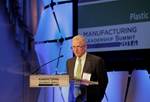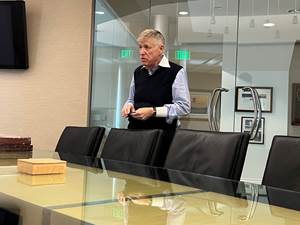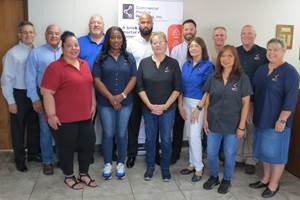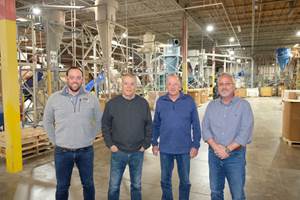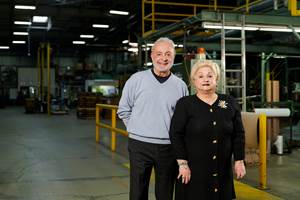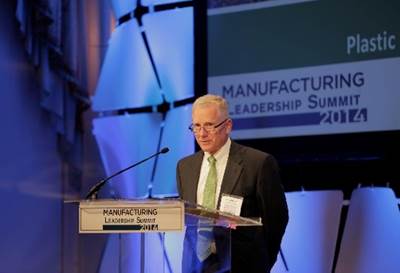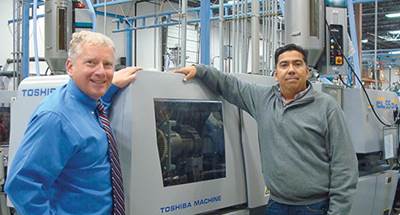On Feb. 5, 2020, Plastic Molding Technology Inc. (PMT) announced plans to lease the unoccupied 39,000 ft2 of its building in El Paso, Texas. To be completed by the fourth quarter of last year, the move would give the 47-yr-old custom injection molder nearly 100,000 ft2 of total space, with room to add more value-added operations and cleanroom molding.
That expansion was part of the company’s revised strategic plan, initiated back in 2019. As we know now, events were already in motion that would render moot the best laid plans of every company and individual in 2020. Just two days before PMT’s press release about its expansion, the U.S. declared a public health emergency in response to the coronavirus, some three days after the World Health Organization (WHO) declared a global health emergency.
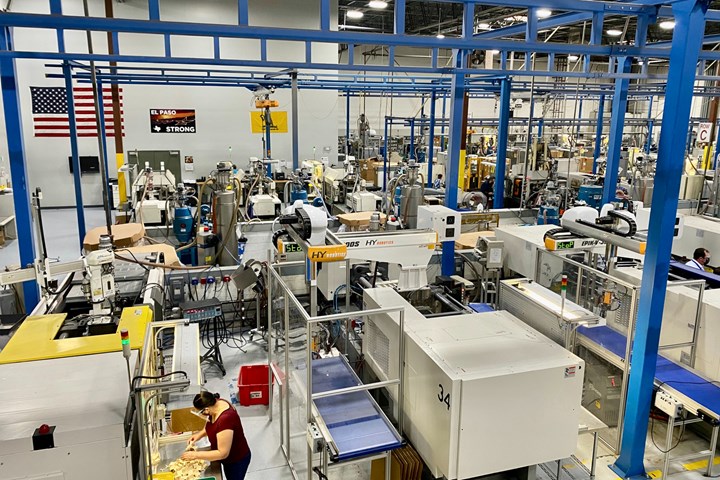
PMT’s 60,000-ft2 facility in El Paso, Texas, employs 100 and runs 24/7.
“We actually had a reasonably good January and February; March was kind of telling; and then came April,” PMT CEO Charles A. Sholtis recalls. As customer shutdowns began last spring, Sholtis says PMT saw a 45% drop in sales, month over month, last April.
Ultimately, PMT did not proceed with the expansion it announced at the beginning of February, first pausing and then canceling the move. That call ultimately benefited its building neighbors, who were no longer in a position to move, amidst the pandemic.
Despite the coronavirus, PMT pivoted to a new plan, and in February 2021, one year after it announced the now abandoned expansion, it took delivery of two new all-electric 110-ton Maruka Toyo injection molding machines. Those machines will occupy a new 1400-ft2 white room, which is to be completed by March. That space will eventually be a class 100,000 cleanroom that can house five machines, as the company seeks to complete its ISO 13485 certification for medical-device production by July. Those weren’t the only investments the company made last year, adding five new injection molding machines—four 200-ton and one 300-tonner—with accompanying robotics.
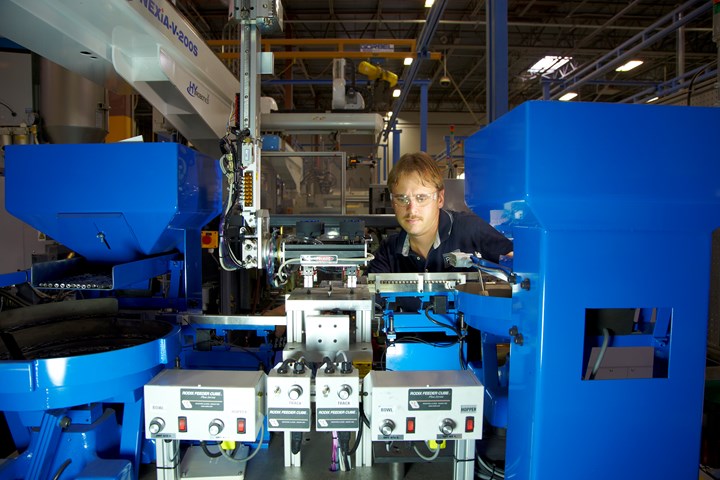
Complex automated insert molding is a core competency at PMT.
Return to Its Roots
Founded in 1973 by Sholtis’ father, Charles E. Sholtis, in Bridgeport, Conn., as Prototype Molding Co. with one Arburg C4B press in a 19th century mill building, PMT began life with a lot of medical molding business. After opening a satellite facility in 2001 in El Paso, PMT completely shifted operations to Texas in 2004, trading medical customers for ones in automotive, business equipment and industrial goods, as it took on more work with NAFTA-propelled maquiladoras.
“We did medical in New England,” Sholtis says, “but when we relocated the plant in 2004, we lost a lot of that business because it was regional.”
In the before times, PMT laid out in its strategic plan an intent to return to medical, with a boost from BIO El Paso-Juarez, a nonprofit created in part to accelerate the formation, expansion/retention and attraction of biomedical enterprises in the region. PMT received a training grant from the nonprofit to support its bid for ISO 13485 certification, including auditor training.
“We were focused on technical auto markets,” Sholtis says, “so we’re getting back to our roots, but this time we’re embracing it in a more straightforward fashion, building out a white room and eventually going to a full cleanroom.”
We never did shut down. We ran 24/7 even if it meant running with a skeleton crew.
Once completed, the class 100,000 cleanroom addition will include a new material drying and conveying system, placed outside the room, delivering resin in a closed system to the presses, with space for assembly and packing. Each machine will feature automation and run “basically a lights-out operation tied in to IQMS Real Time,” Sholtis says.
PMT was bullish about medical prior to COVID-19, but since the pandemic laid bare the shortcomings of OEMs’ far-flung global supply chains, the company is feeling even more optimistic about its prospects to win and keep new business. “I think we can see the writing on the wall,” Sholtis says. “The strategy for a lot of pharmaceutical companies and healthcare companies is they want to reshore.”
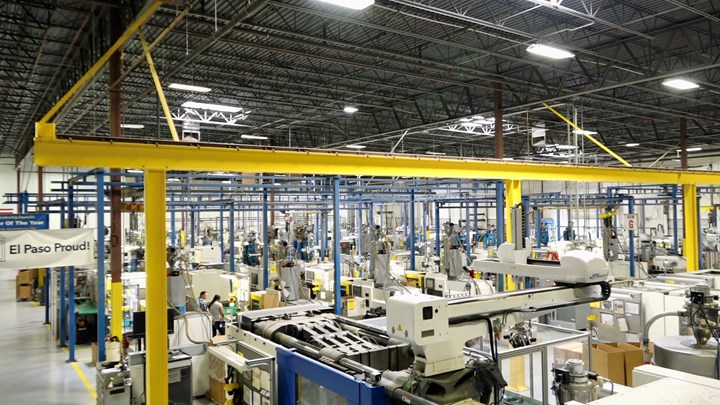
PMT has 62 injection molding machines at its facility in El Paso, ranging in size from 45 to 500 tons.
On the Frontier
Located on the frontier between offshore and the onshore, just 10 minutes from the Ysleta Port of Entry on the border with Mexico, PMT has a unique perspective on the flow of manufacturing work to and from the U.S. and overseas.
Nowhere is this more evident than in the fact that PMT’s value-added offerings not only include typical services like pad printing, hot stamping, welding, assembly, and packaging, but what it calls “supply-chain value added.” That means offering services like local daily deliveries to customer production lines, vendor-managed inventory, stocking agreements, global sourcing for components and Mexican assembly options.
Sholtis says the anecdotal talk of work coming back to the U.S. is more than idle chatter. “I’m seeing a surge in cost studies, requests for quotes, everything from straight injection molding to small subassemblies, so whether we use automation to make the subassembly here or we use direct labor in Texas.”
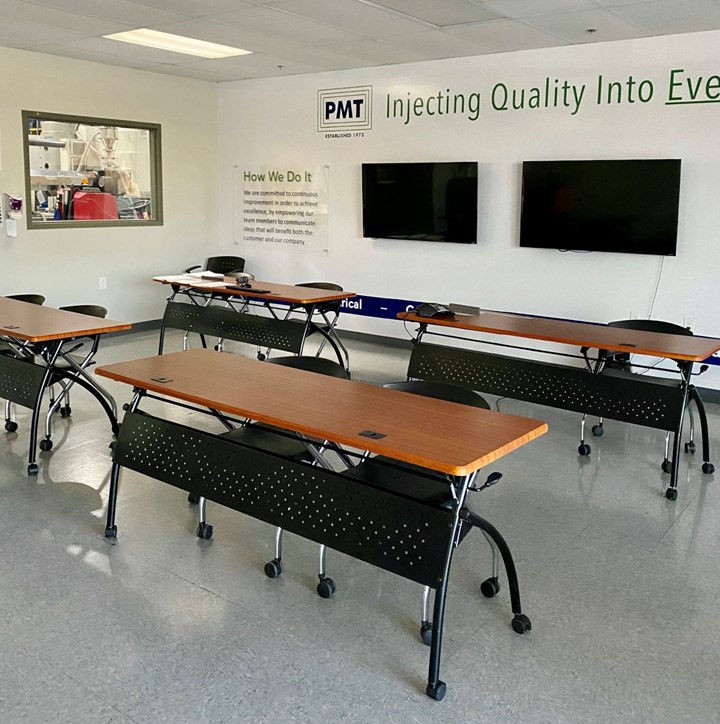
Training, including ongoing Paulson Training and RJG Master Molder courses, is key to PMT’s retention of employees.
Operating in a Pandemic
The coronavirus pandemic never forced PMT to cease production, fulfilling a commitment to customers. “We never did shut down,” Sholtis says. “We ran 24/7 even if it meant running with a skeleton crew.” This was achieved by focusing on protecting its people, Sholtis explained, as PMT worked to procure PPE and look at countermeasures and resources to keep its workers safe and working. “It all paid off in the long run because we were able to stay open. We had a few close calls with respect to COVID and the factory, but as it turns out, the factory is one of the safest places to work during COVID.”
Immediately prior to joining PMT in 1986, Sholtis served as a U.S. Navy officer for three years, and to this day he emphasizes tactics and strategy in business planning. “One of the things I’ve always been a proponent of is: stop, make your assessment, and the put together an action plan going forward.” In the very fluid early days of the pandemic, PMT’s management team identified and evaluated its business options, laying out what steps would need to be taken on a daily, weekly and monthly basis. “We just set up a clear line of communication with our supply base, our employee team, and our customers,” Sholtis says. “One of the biggest factors was being able to peer through the fog of war to see where things were going.”
“The number one thing coming into the pandemic was take care of our team members, be safe.”
The challenge of navigating that fog made PMT’s weekly management meeting, now held virtually, a must-attend. “I think it’s vital that we at least show up,” Sholtis says. “It’s non-negotiable.” These get-togethers addressed many normal to-do-list items—onboarding a new employee, locating a raw material that’s in short supply, air shipping a tool—as well as how not normal the situation was. “We’d also check into everybody’s health,” Sholtis says. “We’d talk up overall health and the psychological aspects of this new paradigm—working remotely and working under some stress with respect to the pandemic. I think it’s important that leaders take that into account.”
Sholtis said these discussions might have led to team members being encouraged to take mental health days, but there were zero lost work days in 2020, despite everything. That was a result of a renewed focus on safety in 2019. “The number one thing coming into the pandemic was take care of our team members, be safe,” Sholtis says. “We’ve got to take care of ourselves, because if we don’t, we’re not going to have a business.”
One year after canceling one expansion plan, in the midst of implementing a different expansion plan, Sholtis sees the pandemic as a teachable moment with a silver lining of optimism as the world and the country moves past it. “We have a lot of lessons learned from it, that’s for sure,” he says. “It’s an exciting time to be a manufacturer. I think plastics is going to play an even greater role with the reshoring. We may be beaten and battered after the pandemic wave of recession last year, but we are back on track and we are unbroken.”
Related Content
US Merchants Makes its Mark in Injection Molding
In less than a decade in injection molding, US Merchants has acquired hundreds of machines spread across facilities in California, Texas, Virginia and Arizona, with even more growth coming.
Read MoreInside the Florida Recycler Taking on NPE’s 100% Scrap Reuse Goal
Hundreds of tons of demonstration products will be created this week. Commercial Plastics Recycling is striving to recycle ALL of it.
Read MoreEvolving Opportunities for Ambitious Plastics Recycler
St. Joseph Plastics grew from a simple grinding operation and now pursues growing markets in recycled PP, food-grade recycled materials, and customized post-industrial and post-consumer compounds.
Read MoreGeneration Gap? Not at Packaging Personified
Started at a kitchen table and now in its third-generation of family involvement, this vertically integrated supplier of flexible packaging traces its success to closely aligning with customers and continually investing in new technology across its films, printing and converting operations.
Read MoreRead Next
Expanding, Diversifying Prepares This Molder for Growth
Three years ago, custom molder Plastic Molding Technology, Inc. (PMT) of El Paso, Tex., must have had a crystal ball.
Read MoreMolder PMT Named Manufacturer of the Year
Texas molder gets this award and two others at American Manufacturing Leadership Summit.
Read MoreMolder’s Mantra: Go Lean, Stay Green
All-electric presses combined with home-built technologies and energy-efficient initiatives at PMT.
Read More



